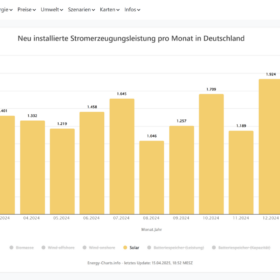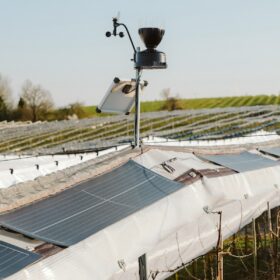Germany’s PV installations down sharply in March
Germany installed just 787.2 MW of new PV capacity in March – the lowest monthly total since December 2022.
Fraunhofer ISE developing heterojunction solar cells with silver consumption of less than 2 mg per W
Researchers at the German institute are seeking to reduce silver use in heterojunction PV devices under the umbrella of an extensive research projects. Among their recent achievements there is the fabrication of a heterojunction cell that requires a minimal silver consumption of only 1.4 mg per W.
EcoFlow launches balcony PV system, batteries with AI features
EcoFlow’s new Stream series, its second-gen balcony solar plant, enables battery coordination and plug-and-play solar for distributed batteries, plus third-party microinverter coordination for its new battery.
Low-temperature solar cell interconnection tech based on conductive coated wires
Solyco is developing a new low-temperature technology for the interconnection of solar cells. It consists of a round copper core with a diameter of 280 μm that is covered by a very thin layer of silver for corrosion protection and then surrounded by a 40 μm coating of an electrically conductive thermoplastic.
The Hydrogen Stream: Fincantieri to build hydrogen-powered cruise ship
Fincantieri says it is building the world’s first hydrogen-powered cruise ship for delivery in late 2026, while Coca-Cola Bottlers Japan says it will debut the world’s first hydrogen-powered vending machine at the Kansai Expo this year.
Current UV tests overestimate TOPCon solar module degradation
Fraunhofer Institute for Solar Energy Systems ISE (Fraunhofer ISE) has found that current UV testing methods overestimate degradation in tunnel oxide passivated contact (TOPCon) solar modules, as dark storage after UV exposure causes temporary efficiency losses that largely reverse under sunlight.
Modern slavery and other clean energy ESG risks
Despite debates in some parts of the world, we can expect environmental, social, and corporate governance (ESG) regulation to continue making headlines in 2025. Everoze Partner Ragna Schmidt-Haupt demystifies the key sustainability risks and opportunities for solar and battery energy storage system (BESS) projects.
Fraunhofer ISE testing agrivoltaics on standard weather protection covers
Fraunhofer ISE and German weather protection specialist VOEN Vöhringer are testing an agrivoltaic system that uses existing crop cover structures to support solar modules, eliminating the need for a dedicated mounting system.
German home battery owners can save state millions with ‘a maximum of six clicks’
Berlin-based researchers behind the ‘Your Power Storage Can Do More!’ initiative want home battery owners to use intelligent charging to help the grid and state budget, and slow battery aging.
TWL unveils PVT panels for ground-source heat pumps
The German specialist for solar thermal energy and heat storage said its new PVT collectors rely on double-glass and monocrystalline TOPCon cells. The product has a power conversion efficiency of 22.5% and a maximal thermal ouput of 1,100 W.










